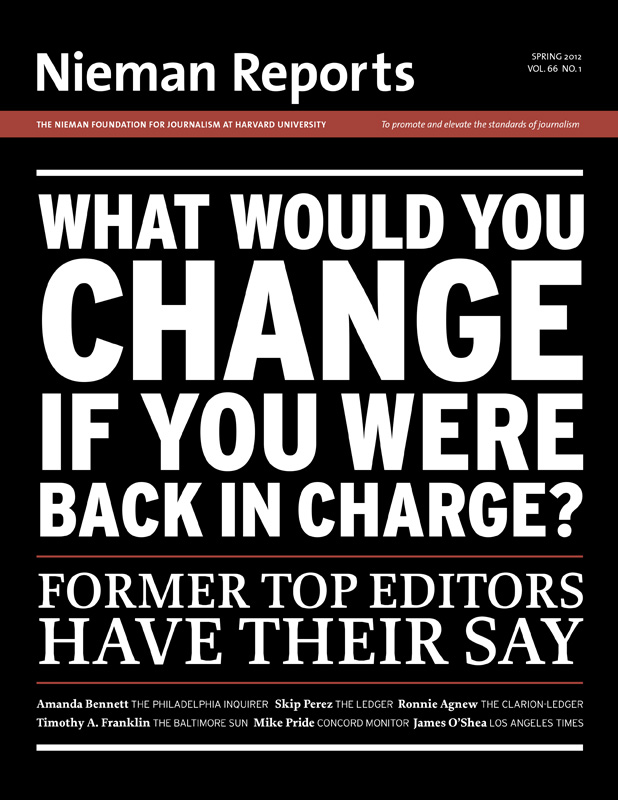RELATED ARTICLE
“Turn the Newsroom Inside Out”
- Mike PrideLike any institution, today's Concord Monitor is captive to past decisions. Just over two decades ago, before cell phones and the Internet were part of daily newspaper life, the Monitor's owners built a modern office building and printing plant five miles from downtown. It was a wonder—spacious quarters and a big, state-of-the-art press that allowed us to publish a Sunday newspaper and start a profitable printing business. These were the days before full pagination, and we still needed a composing room to paste up our pages. The building is still a jewel set on a bluff high above the Merrimack River, but what you notice inside are empty desks and vacant spaces.
Given the luxury of starting anew, I'd move the Monitor staff back to downtown Concord and print the newspaper offsite. Operating from Main Street would hold many advantages. The paper's journalists would be closer to the news and they'd get more story tips. They'd be more visible, helping the paper's image as a major player in the community.
For all my 30 years at the Monitor, every editor and reporter had a desk, a chair, and a computer terminal in the newsroom. Journalists today can do their jobs anywhere. My newsroom would thus be small. Less space would mean less overhead, and any savings could go to building a larger reporting staff.
At a paper that depends on the rapid professional growth of beginning reporters and photojournalists, people learn while working together. Yet as every editor knows, the reporters who spend the most time out of the office are the most plugged-in and productive.
“Turn the Newsroom Inside Out”
- Mike PrideLike any institution, today's Concord Monitor is captive to past decisions. Just over two decades ago, before cell phones and the Internet were part of daily newspaper life, the Monitor's owners built a modern office building and printing plant five miles from downtown. It was a wonder—spacious quarters and a big, state-of-the-art press that allowed us to publish a Sunday newspaper and start a profitable printing business. These were the days before full pagination, and we still needed a composing room to paste up our pages. The building is still a jewel set on a bluff high above the Merrimack River, but what you notice inside are empty desks and vacant spaces.
Given the luxury of starting anew, I'd move the Monitor staff back to downtown Concord and print the newspaper offsite. Operating from Main Street would hold many advantages. The paper's journalists would be closer to the news and they'd get more story tips. They'd be more visible, helping the paper's image as a major player in the community.
For all my 30 years at the Monitor, every editor and reporter had a desk, a chair, and a computer terminal in the newsroom. Journalists today can do their jobs anywhere. My newsroom would thus be small. Less space would mean less overhead, and any savings could go to building a larger reporting staff.
At a paper that depends on the rapid professional growth of beginning reporters and photojournalists, people learn while working together. Yet as every editor knows, the reporters who spend the most time out of the office are the most plugged-in and productive.



